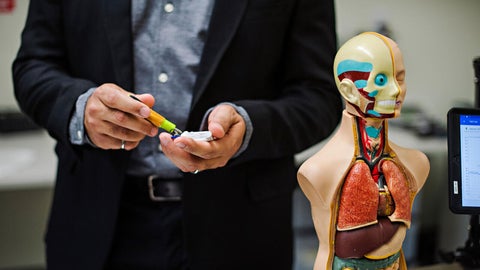
Waterloo startup testing nanotechnology to reach better postoperative patient outcomes

Growing up, Youssef Helwa was fascinated by his mother’s stories about the patients she cared for as a surgeon. Those conversations became the inspiration behind his company, FluidAI. FluidAI, formerly NERv Technology Inc., is currently developing a smart monitoring system that will examine biological data and alert health-care providers to possible complications following abdominal surgery.
Youssef Helwa (MASc'17)
Alumni, Faculty of Engineering
> Co-founder and CEO, FluidAI
> Velocity Alumni
The current standard of care sees an average of eight per cent of all abdominal surgeries developing serious post-operative complications. The complications are typically clinically silent, presenting no symptoms until the issue becomes serious and life threatening. By the point of symptom onset, the complications can carry an average mortality rate of 12 per cent.
“The best way to comprehend the problem is to think about the operative care journey for patients,” says Helwa. “Patients come out of surgery, and unfortunately, a subset of these patients ends up developing some sort of complication. They start becoming sick with symptoms, and doctors must start playing the game of investigating why these patients are feeling sick.”
FluidAI’s smart monitoring system removes some of that guesswork by helping caregivers identify leaks, bleeds or potential infections much earlier than the current standard of care. Detecting these clinically silent issues before the onset of detectable symptoms allows the health care provider to intervene before the complication becomes critical. This reduces both mortality and the length of stay at the hospital in recovery.
“Right now, the timeline between investigation of the root cause and treatment is a problem. If you can pick up on the complication from the point it manifests and intervene or change how you're administering care to the patient, you could end up with drastically different results.”
Support through their university career and beyond
Helwa’s path to founding FluidAI started at the age of 15. Helwa was living in Saudi Arabia when he learned about the Nanotechnology Engineering program at Waterloo. The following year, he began his studies and soon discovered the potential impact engineering could have on medical care. “I started to wonder if I could bridge engineering with current problems in medicine to come up with a way to have better results for how patients recover.”
Helwa soon became friends with Amr Abdelgawad, and the two began to build a vision of how they would disrupt the field of medicine.
“Both of us come from families who are in medicine. Together we aligned our vision and our objectives to make something happen. We worked on our ideas throughout our undergrad program, and then during my masters, I had a supportive supervisor who empowered us to continue to work on the company. That gave us access to state-of-the-art research facilities and great minds who helped us tackle one challenge after another.”
The growth of a biomedical ecosystem at Waterloo
When Helwa and Abdelgawad founded FluidAI, the ecosystem for medical devices was new in the Waterloo region.
“When we got started, there was a lot of knowledge and a lot of past experiences from software and hardware companies, but there weren’t many medical device companies. The ecosystem advanced dramatically over the last five to seven years. The number of medical companies increased exponentially. Waterloo has been behind that change with the University’s biomedical engineering program and places like Velocity and Medical Innovation Xchange helping health-care startups.”
He credits the University of Waterloo with preparing him to build FluidAI and embarking on the life of an entrepreneur.
“My time [at Waterloo] was a valuable transformational experience for me. It's not like I come from a family of entrepreneurs. Waterloo provided that strong entrepreneurial mindset and mentality.”
The University of Waterloo is building out a pipeline for health innovation in Southwestern Ontario thanks to a $10-million investment from FedDev Ontario.
The investment will support a new partnership between Velocity, Western University, the City of Kitchener and Medical Innovation Xchange (MIX) to build a Southwestern Ontario Health Innovation network. This partnership will strengthen the Canadian tech ecosystem, specifically in the health and medtech sector by supporting innovators and entrepreneurs from start to scale.
Clinical trials and beyond
Today, Helwa is the Chief Executive Officer of FluidAI and he continues to focus on scaling his startup to a leading medical company. Abdelgawad is the Chief Operating Officer while other Waterloo grads include Abdallah El-Falou, FluidAI’s Chief Technology Officer, who works on the development of the organization’s technology and Mohamed Okasha, FluidAI's Research & Development Scientist who has contributed to the development of the sensor technology.
FluidAI is in the process of conducting clinical studies at several sites across North America, including the world-renowned Cleveland Clinic, and the company has recently raised more than $7 million in funding. They received Health Canada approval in early 2022 and expect to have a global reach with their ground-breaking device.
“Very recently, we reached the point where our devices are functioning every minute of every day on patients somewhere in the world. The feedback has been incredible. We went into the clinical studies with certain expectations, and so far, it’s been a blessing where we are surpassing every one of our expectations.”